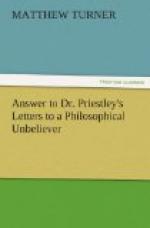most generally represented to be. Dr. Priestley
being clear in his opinion; that the being of a God
is capable of being proved by reason, is not so weak
as some of his fellow-labourers, who hold the powers
of reason in so low estimation as to be incapable
of themselves to arrive at almost any truth.
He must however allow, if reason proves a Deity and
his attributes there was less use of revelation to
prove them. But the learned advocates of a Deity
differ greatly among themselves, whether his existence
is capable of being ascertained by fixt principles
of reason. After such a difference and the instance
of so many great men in all ages, from Democritus
downward, who have confidently denied the being of
a God, whose arguments the learned Dr. Cudworth, in
the last century, only by fully and fairly stating,
with all the answers in his power to give (though
his zeal in religion was never doubted) was thought
by other divines to have given a weight to atheism
not well to be overturned, it is surprising that it
should be the common belief of this day, that an argument
in support of atheism cannot stand a moment, and that
even no man in his senses can ever hold such a doctrine.
All that Epicurus and Lucretius have so greatly and
convincingly said is swept away in a moment by these
better reasoners, who yet scruple not to declare,
with Dr. Priestley, that what they reason about is
not the subject of human understanding. But let
it be asked, is it not absurd to reason with a man
about that of which that same man asserts we have
no idea at all? Yet will Dr. Priestley argue,
and say it is of no importance, whether the person
with whom he argues has a conception or not of the
subject. “Having no ideas includes no impossibility,”
therefore he goes on with his career of words to argue
about an unseen being with another whom he will allow
to have no idea of the subject and yet it shall be
of no avail in the dispute, whether he has or no,
or whether he is capable or incapable of having any.
Reason failing, the passions are called upon, and the
imagined God is represented at one time, with all
the terrors of a revengeful tyrant, at another with
all the tenderness of an affectionate parent.
Shall then such a tremendous Being with such a care
for the creatures he has made, suffer his own existence
to be a perpetual doubt? If the course of nature
does not give sufficient proof, why does not the hand
divine shew itself by an extraordinary interposition
of power? It is allowed miracles ought not to
be cheap or plenty. One or two at least every
thousand years might be admitted. But this is
a perpetual standing miracle, that such a Being as
the depicted God, the author of nature and all its
works, should exist and yet his existence be perpetually
in doubt, or require a Jesus, a Mahomet or a Priestley
to reveal it. Is not the writing of this very
answer to the last of those three great luminaries
of religion a proof, that no God, or no such
God at least, exists. Hear the admirable words
of the author of “The System of Nature;”
Comment permet il qu’un mortel comme moi ose
attaquer ses droits, ses titres, son existence meme?




